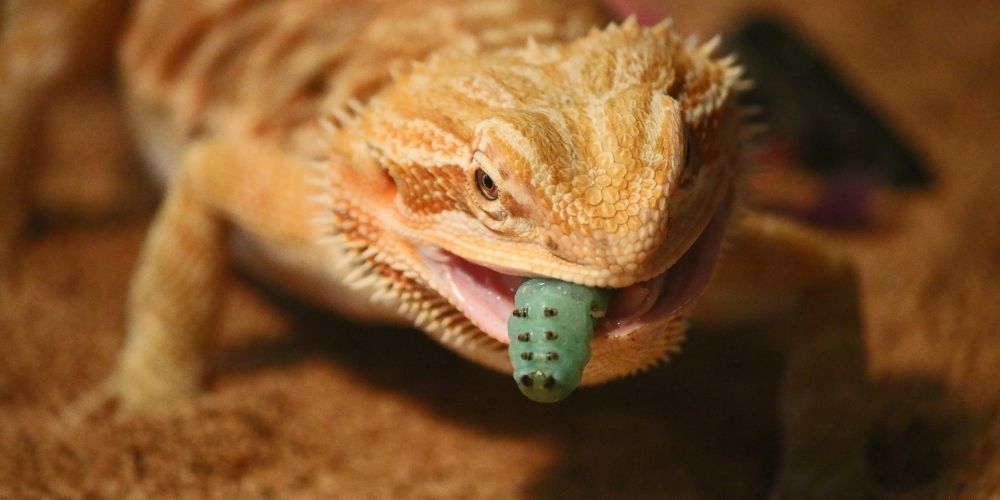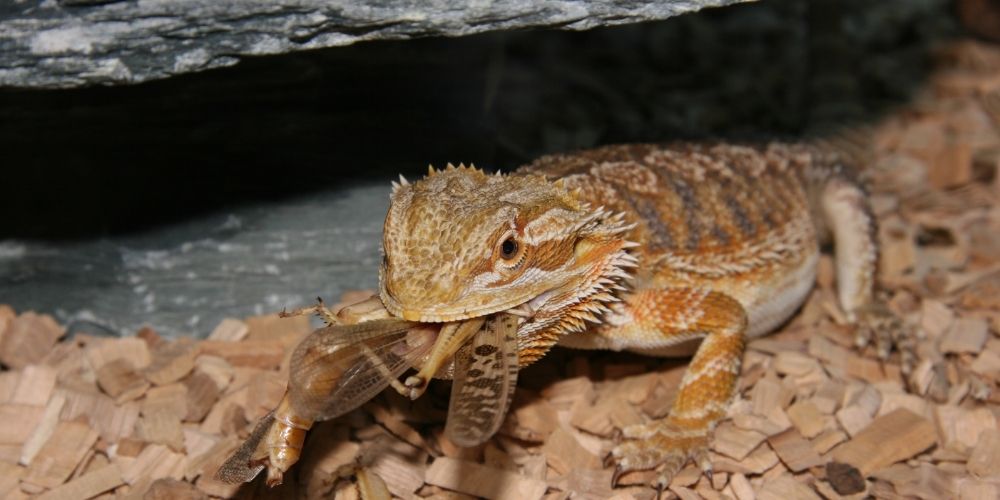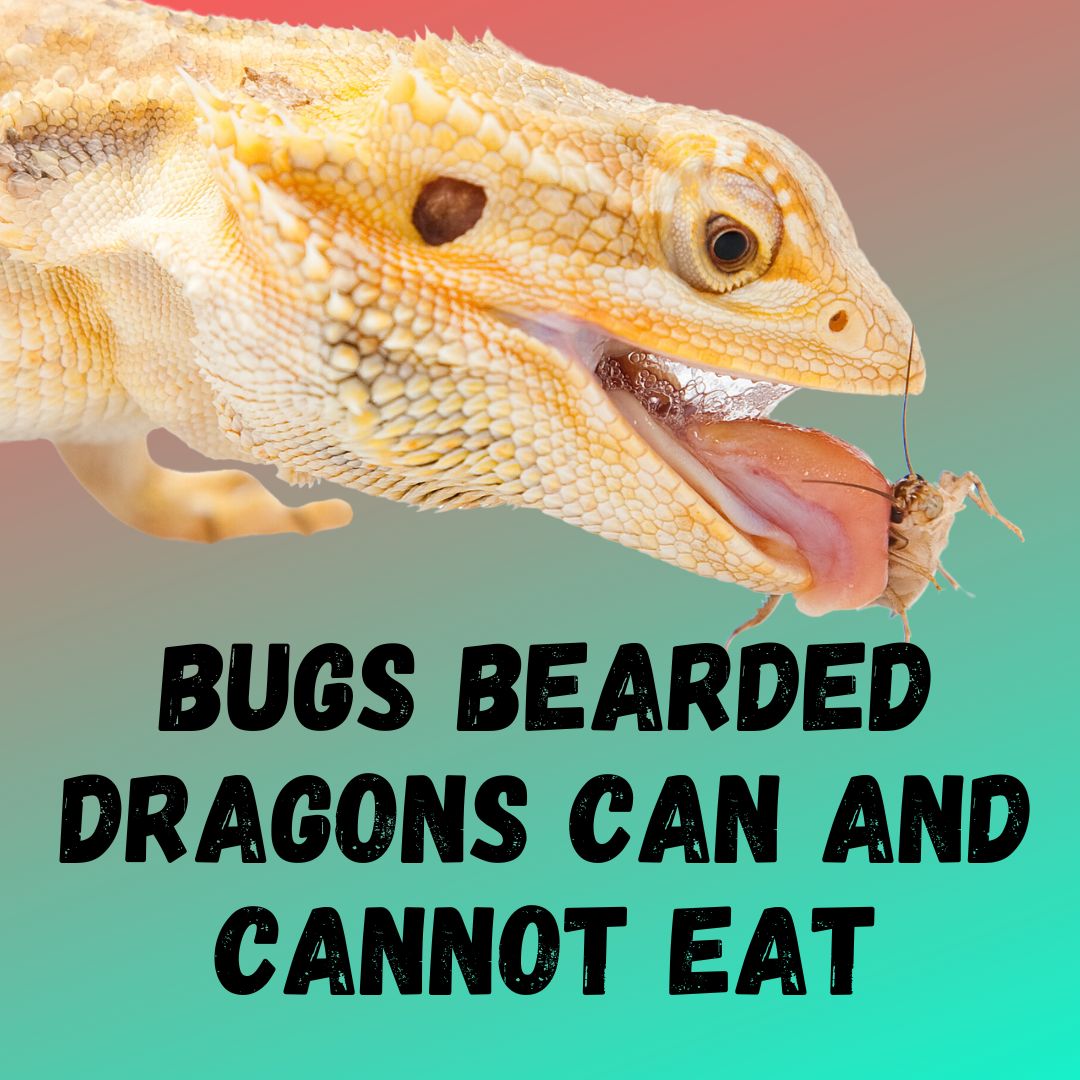Bearded dragons are omnivorous reptiles and can eat a variety of insects as part of their diet. However, not all bugs are safe or healthy for bearded dragons to eat. Here are some insects that bearded dragons can eat, and some that should be avoided:
Post Contents
Insects that bearded dragons can eat:
- Crickets: Crickets are a popular choice for bearded dragons, as they are high in protein and easy to find at pet stores.
- Dubia roaches: Dubia roaches are a good alternative to crickets, as they are less likely to escape and have a softer exoskeleton, making them easier to digest.
- Mealworms: Mealworms are another good source of protein, but they should be fed in moderation as they have a high fat content.
- Waxworms: Waxworms are high in fat and should only be fed occasionally as a treat.
- Superworms: Superworms are a good source of protein but should be fed in moderation as they have a tough exoskeleton that can be difficult to digest.
Insects to avoid feeding Bearded Dragons:
- Fireflies: Fireflies contain a toxin called lucibufagins, which can be harmful to bearded dragons.
- Ladybugs: Ladybugs may contain a toxic substance called cantharidin, which can cause digestive issues and other health problems in bearded dragons.
- Butterflies and moths: Some species of butterflies and moths are toxic to bearded dragons and can cause digestive issues or other health problems.
- Ants: While some species of ants are safe for bearded dragons to eat, others can be aggressive and may sting or bite.
- Bees and wasps: Bees and wasps are not safe for bearded dragons to eat and can cause allergic reactions or other health problems.
It’s important to provide a varied diet for your bearded dragon and to avoid feeding them insects that may be harmful to their health. Always research the insects you plan to feed your bearded dragon and buy them from a reputable source.

What Insects Can Bearded Dragons Eat Everyday
It’s not recommended to feed the same insects to bearded dragons every day, as this can lead to nutritional imbalances and health issues. Instead, it’s best to offer a variety of insects as part of their diet. Here are some insects that can be fed to bearded dragons regularly:
- Crickets: Crickets are a popular choice for bearded dragons as they are readily available, affordable, and a good source of protein.
- Dubia roaches: Dubia roaches are another good option as they have a soft exoskeleton that is easy to digest and are less likely to escape.
- Black soldier fly larvae: Black soldier fly larvae are high in protein and calcium and are a good option for bearded dragons.
- Hornworms: Hornworms are high in water content and are a good source of hydration for bearded dragons.
- Phoenix worms: Phoenix worms are small and soft, making them easy for bearded dragons to digest.
Can Bearded Dragons Eat Spiders?
While bearded dragons may eat spiders in the wild, it’s not recommended to feed them spiders as part of their captive diet. Spiders may carry parasites or toxins that could harm your bearded dragon.
Can Bearded Dragons Eat Flies?
Bearded dragons can eat flies, but they should be fed in moderation. Flies may carry parasites or disease, so it’s important to only feed your bearded dragon flies that have been raised in a hygienic environment.
Can Bearded Dragons Eat Praying Mantis?
Bearded dragons can eat praying mantis, but they should be fed in moderation as they have a hard exoskeleton that can be difficult to digest. Additionally, praying mantis may carry parasites or toxins that could harm your bearded dragon.
Can Bearded Dragons Eat Stink Bugs?
It’s not recommended to feed stink bugs to bearded dragons. Stink bugs have a defensive chemical that can cause digestive issues and other health problems for bearded dragons.
Can Bearded Dragons Eat Japanese Beetles?
Japanese beetles are not toxic to bearded dragons, but they should be fed in moderation as they have a hard exoskeleton that can be difficult to digest. Additionally, Japanese beetles may contain pesticides or other harmful substances if they have been collected from an area that has been treated with chemicals.
Can Bearded Dragons Eat Ladybugs?
It’s not recommended to feed ladybugs to bearded dragons. Ladybugs may contain a toxic substance called cantharidin, which can cause digestive issues and other health problems in bearded dragons.
Can Bearded Dragons Eat Beetles?
Bearded dragons can eat some species of beetles, such as mealworm beetles or superworm beetles. However, they should be fed in moderation as they have a hard exoskeleton that can be difficult to digest.
Can Bearded Dragons Eat Superworms?
Superworms can be fed to bearded dragons in moderation as part of a varied diet. However, they should not be fed exclusively as they have a high fat content.
Can Bearded Dragons Eat Nightcrawlers?
Nightcrawlers, also known as earthworms, can be fed to bearded dragons in moderation as they are a good source of protein. However, it’s important to only feed them nightcrawlers that have not been exposed to pesticides or other harmful substances.
Can Bearded Dragons Eat Flying Insects?
Bearded dragons can eat flying insects such as flies, moths, or butterflies, but they should be fed in moderation. Flying insects may carry parasites or disease, so it’s important to only feed your bearded dragon insects that have been raised in a hygienic environment.
Can Bearded Dragons Eat Wax Worms?
Wax worms can be fed to bearded dragons in moderation as a treat, but they should not be fed exclusively as they have a high fat content.
Can Bearded Dragons Eat Calci Worms?
Calci worms, also known as black soldier fly larvae, can be fed to bearded dragons as part of a varied diet. They are a good source of protein and calcium.
Can Bearded Dragons Eat Dead Worms?
It’s not recommended to feed dead worms to bearded dragons, as they may contain harmful bacteria or parasites.
Can Bearded Dragons Eat Dried Worms?
Dried worms such as mealworms or superworms can be fed to bearded dragons in moderation, but they should not be fed exclusively as they may have a high fat content.
Can Bearded Dragons Eat Horn Worms?
Hornworms can be fed to bearded dragons as part of a varied diet. They are a good source of hydration as they are high in water content.

Pros and Cons of Feeding Bugs to Bearded Dragon
Feeding bugs to bearded dragons is a common practice as insects are a great source of protein and other nutrients. However, there are both pros and cons to feeding bugs to bearded dragons.
Pros:
- Nutritious: Bugs are high in protein and other important nutrients that bearded dragons need for healthy growth and development.
- Variety: Feeding a variety of insects can help provide a more balanced diet for bearded dragons.
- Stimulates Hunting Instincts: Feeding live insects can stimulate a bearded dragon’s natural hunting instincts and provide mental stimulation.
- Can be Easy to Obtain: Bugs such as crickets and mealworms are readily available at most pet stores and online.
Cons:
- Risk of Parasites: Insects can carry parasites that can be harmful to bearded dragons, so it’s important to only feed insects that are healthy and have been raised in a hygienic environment.
- Risk of Toxins: Insects can also carry toxins if they have been exposed to pesticides or other chemicals, so it’s important to only feed insects that are free of harmful substances.
- Hard Exoskeletons: Some insects have hard exoskeletons that can be difficult for bearded dragons to digest, so it’s important to only feed insects that are an appropriate size for your bearded dragon.
- Potential Allergies: Some bearded dragons may have an allergic reaction to certain types of insects, so it’s important to monitor your pet for any signs of an allergic reaction.
- Inconvenience: Feeding live insects can be time-consuming and messy, and some insects require special care and maintenance to keep them healthy and alive.
Overall, feeding bugs to bearded dragons can be a healthy and enjoyable part of their diet, as long as proper precautions are taken to ensure that the insects are healthy and free of harmful substances.
Summary
It’s important to gut-load the insects before feeding them to your bearded dragon, which means feeding them a nutritious diet for 24-48 hours before offering them to your reptile. This will ensure that the insects are providing optimal nutrition for your bearded dragon. Additionally, it’s recommended to dust the insects with a calcium supplement and a vitamin supplement to ensure that your bearded dragon is receiving all the necessary nutrients in their diet.

94% of pet owners say their animal pal makes them smile more than once a day. In 2007, I realized that I was made for saving Animals. My father is a Vet, and I think every pet deserves one. I started this blog, “InPetCare”, in 2019 with my father to enlighten a wider audience.
